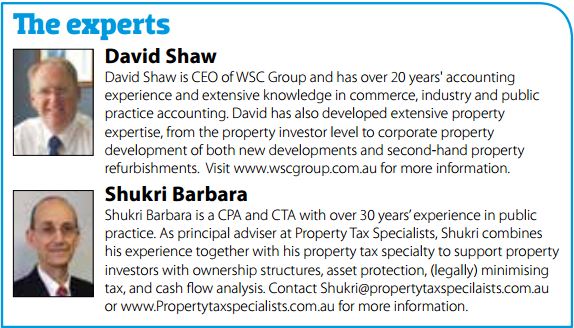Our tax experts are on hand to answer any tax queries you have regarding your property investments and wealth-creation strategies. Email your taxing questions to editor@yipmag.com.au

Looking for a loan?
Compare Investment Home Loans and SMSF Loans
Our tax experts are on hand to answer any tax queries you have regarding your property investments and wealth-creation strategies. Email your taxing questions to editor@yipmag.com.au

By subscribing you agree to our privacy policy.
READ MORE: Tax Q&As
Australia's home values continued to track upwards in July, according to the latest data from Cotality's Home Value Index (HVI).
YourInvestmentPropertyMag.com.au provides general information and comparison services to help you make informed financial decisions. We do not cover every product or provider in the market. Our service is free to you because we receive compensation from product providers for sponsored placements, advertisements, and referrals. Importantly, these commercial relationships do not influence our editorial integrity.
For more detailed information, please refer to our How We Get Paid, Managing Conflicts of Interest, and Editorial Guidelines pages.
At YourInvestmentPropertyMag.com.au, we are passionate about helping Australians make informed financial decisions. Our dedicated editorial team works tirelessly to provide you with accurate, relevant, and unbiased information. We pride ourselves on maintaining a strict separation between our editorial and commercial teams, ensuring that the content you read is based purely on merit and not influenced by commercial interests.
Learn more about our commitment to editorial integrity in our Editorial Guidelines.
Our service is free for you, thanks to support from our partners through sponsored placements, ads, and referrals. We earn compensation by promoting products, referring you, or when you click on a product link. You might also see ads in emails, sponsored content, or directly on our site.
For more details, see How We Get Paid.
We strive to cover a broad range of products, providers, and services; however, we do not cover the entire market. Products in our comparison tables are sorted based on various factors, including product features, interest rates, fees, popularity, and commercial arrangements.
Some products will be marked as promoted, featured or sponsored and may appear prominently in the tables regardless of their attributes.
Additionally, certain products may present forms designed to refer you to associated companies (e.g. our mortgage broker partner) who may be able to assist you with products from the brand you selected. We may receive a fee for this referral.
You can customise your search using our sorting and filtering tools to prioritise what matters most to you, although we do not compare all features and some results associated with commercial arrangements may still appear.
For more details, visit How We Get Paid and Managing Conflicts of Interest.
For home loans, the base criteria include a $500,000 loan amount over 30 years. These rates are only examples and may not include all fees and charges.
*The Comparison rate is based on a $150,000 loan over 25 years. Warning: this comparison rate is true only for this example and may not include all fees and charges. Different terms, fees or other loan amounts might result in a different comparison rate.
Monthly repayment figures are estimates that exclude fees. These estimates are based on the advertised rates for the specified term and loan amount. Actual repayments will depend on your circumstances and interest rate changes.
Monthly repayments, once the base criteria are altered by the user, will be based on the selected products’ advertised rates and determined by the loan amount, repayment type, loan term and LVR as input by the user/you.
YourInvestmentPropertyMag.com.au is proudly part of the InfoChoice Group, which includes InfoChoice.com.au, Savings.com.au, and YourMortgage.com.au. The InfoChoice Group is associated with the Firstmac Group.
We may include products and services from loans.com.au, CarLoans.com.au, OnlineAuto.com.au, and YourMortgageBroker Pty Ltd, all associated with the Firstmac Group. Importantly, these brands are treated like any other commercial partner.
Learn more about how we manage conflicts of interest.
The information provided by YourInvestmentPropertyMag.com.au is general in nature and does not take into account your personal objectives, financial situation, or needs. We recommend seeking independent financial advice before making any financial decisions. Before acquiring any financial product, obtain and read the relevant Product Disclosure Statement (PDS), Target Market Determination (TMD), and any other offer documents.
Rates and product information should be confirmed with the relevant credit provider. For more information, read YourInvestmentPropertyMag.com.au’s Financial Services and Credit Guide (FSCG).